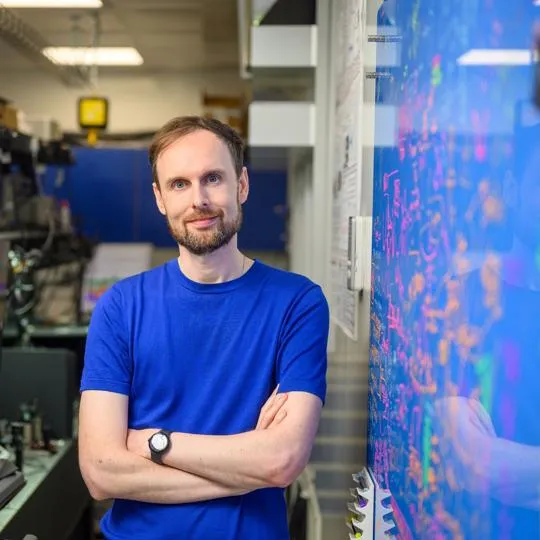The ability to levitate tiny objects in space using laser beams never fails to capture the public's imagination, especially with its connections to the mysteries of quantum physics. It's with great excitement that we will exploit the techniques and fundamental insights gained through our previous research programmes, and turn them towards technology. Who knows, perhaps one day every quartz crystal in a digital clock and every vibrating antenna in a smartphone will be replaced with tiny levitating objects? That is the dream of this project!
27 April 2020
King's LeviTech project receives €150,000 ERC grant funding
Through its use of innovative levitation techniques, the project will apply the principles of quantum science to technology – paving the way to revolutionise effective sensing technology in industry.

Researchers at King’s have received €150,000 in grant funding from the European Research Council (ERC) to develop the LeviTech project, led by Dr James Millen, Lecturer in advanced photonics in the Department of Physics.
Awarded to principle investigators who already hold an ERC Starting Grant, this Proof of Concept funding will extend research on the boundary between quantum physics and nanotechnology into the realm of practical technology.
Current research into mechanical devices with technological applications is dominated by Micro-Electromechanical Systems. These devices are commonly used as sensors in industries ranging from healthcare to virtual reality, due to their ability to be mass fabricated. However, their performance is ultimately limited by the energy they lose as they vibrate; a problem which gets worse as devices become smaller in line with escalating demand for miniaturised technology.
LeviTech’s innovative approach to this problem centres on the application of levitation to free a device from its environment, in order to prevent energy loss. Nanoparticles will be levitated within circuits (illustrated), generating electrical signals to form the heart of new sensing technologies. In doing so, the project will demonstrate how techniques from fundamental quantum science can be applied to the realm of technology, enabling the miniaturisation of optical and electrical levitation technologies.
In pushing developments towards a state suitable for state-of-the-art sensing and commercial collaboration, LeviTech paves the way for the generation of entirely new types of electrical devices which feature a core of levitated nanoparticles that generate electrical signals. In the wider scope, this technology has the potential to revolutionise gyroscopes in mobile phones, pressure sensors in the chemical industries, positioning in autonomous vehicles and also facilitate more precision in VR gaming.
On the impact of the ERC’s grant towards LeviTech on the wider research field, James commented;
Through connecting abstract ideas and concrete technology, LeviTech will also feature in James’ Quantum Workshop public engagement project, which demonstrates how levitation works.
This funded research complements the current work of the King’s Photonics & Nanotechnology group by shedding new light on the behaviour of such tiny materials. The groups’ research focus involves an interdisciplinary approach towards the development and application of advanced photonic technologies and novel nanomaterials to address modern challenges in photonic and quantum technologies, new nanostructured materials, sensing, imaging and clean energy. The group had recently opened a new suite of photonics and nanofabrication laboratories at King’s, cementing its recent partnership with the London Centre for Nanotechnology.

